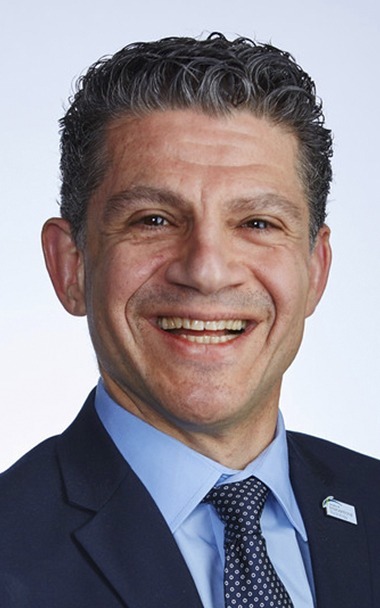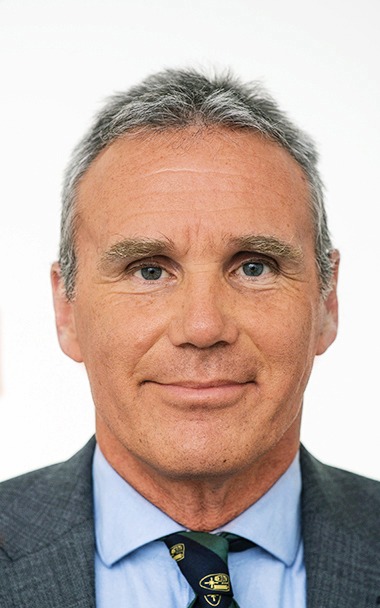At CIRSE 2025, Prof. Adam Hatzidakis, Prof. Constantinos Sofocleous, and Prof. Otto van Delden will join the ranks of distinguished fellows for having made exceptional contributions to the practice and science of interventional radiology.
Distinguished Fellows
Distinguished Fellow 2025 | Prof. Adam Hatzidakis

Prof. Adam Hatzidakis
will be awarded at
the CIRSE 2025 Opening and Awards Ceremony

Prof. Adam Hatzidakis
will be awarded at
the CIRSE 2025 Opening and Awards Ceremony

Prof. Adam Hatzidakis
will be awarded at
the CIRSE 2025 Opening and Awards Ceremony
Prof. Adam Hatzidakis
will be awarded at
the CIRSE 2025 Opening and Awards Ceremony
Prof. Hatzidakis is a professor of radiology at the Aristotle University School of Medicine (AUSoM) in Thessaloniki, Greece. He has practiced interventional radiology since 1993, first at the Heraklion University Hospital Medical School of Crete, and then at the AUSoM for the past six years. 400 Greek students and 60 international students are educated in radiology and interventional procedures at the medical school every year. He is the head of a very active body and neuro IR department at “AHEPA” University Hospital, providing IR service for five different city hospitals with a total of more than 2,000 beds.
At the beginning of his career, he was lucky to be trained under the supervision of legendary teachers in important teaching centres, including the Air-Force Hospital in Athens, the University Hospitals of Sapienza in Rome, then the Technical University of Aachen, and finally at Guy’s and St Thomas’s Hospitals in London. After completing his IR training, he managed to introduce many IR procedures in Greece, like cholecystostomy, biliary lithotripsy, cholangioscopy, RF ablation, and TIPS. Under his supervision, many generations of young radiologists were inspired to train in interventional radiology, becoming important members of the IR community in Greece and Europe.
Prof. Hatzidakis has consistently supported CIRSE with uninterrupted attendance and has been a presenter or on the faculty every year since CIRSE 1994. He is a longstanding CIRSE member and a proud fellow, serving for about 23 years in various committees as a member or chairperson. As a member of the first SOP committee, he constructed the first document on biliary interventions in 2002. In a difficult period for the Society in 2004, he helped as the chairperson of the Rules Committee to restructure and modernize CIRSE’s statutes. In 2006, as chairperson of the Membership Committee, he co-introduced the national group membership category, rapidly increasing the Society’s membership number. Finally, as deputy and afterwards as chairman of the CIRSE Scientific Programme Committee, he helped conduct the virtual Summits during the difficult COVID period and then organized the post-pandemic annual meetings with great success.
He is a reviewer in many radiology journals and has authored or co-authored over 100 papers. He has delivered more than 250 invited lectures in the field of interventional radiology in scientific meetings and teaching programmes. As a member of the Greek IR Society Executive Committee, he has helped organize the educational and professional environment in the country over the last 30 years and recently was the local host of this year’s annual meeting.
Prof. Hatzidakis is a passionate MD and IR with just one ambition: to create as many highly-trained doctors as possible so that they may cover the field of IR in all major national hospitals, thereby establishing and securing the future of interventional radiology in modern clinical practice.
Distinguished Fellow 2025 | Constantinos Sofocleous

Prof. Constantinos Sofocleous
will be awarded at
the CIRSE 2025 Opening and Awards Ceremony

Prof. Constantinos Sofocleous
will be awarded at
the CIRSE 2025 Opening and Awards Ceremony

Prof. Constantinos Sofocleous
will be awarded at
the CIRSE 2025 Opening and Awards Ceremony
Prof. Constantinos Sofocleous
will be awarded at
the CIRSE 2025 Opening and Awards Ceremony
Prof. Sofocleous is a professor of interventional radiology at Weill-Cornell Medical College. He has practiced interventional oncology at Memorial Sloan Kettering Cancer Center in New York City since 2002. He is the head of a Memorial Sloan Kettering research lab, “The Sofocleous Lab”, dedicated to the assessment of image-guided interventional oncology treatment assessments for colorectal metastatic disease.
Prof. Sofocleous is a proud fellow of the SIR and CIRSE and he is a global ambassador of IR. His role was pivotal in collaborations between CIRSE and SIR with the establishment of the Global IR Summit, the completion of a global IR survey recently presented at SIR and CIRSE 2024, and published in JVIR. He has served as the International Councilor and a member of the Executive Council of the Society of Interventional Radiology since 2021 and as a councilor at large and member of the SIR Board of Directors as of April 2025. He is a founding member and served as a board member of the Society of Interventional Oncology from 2017-2023. His role was important for the collaboration between CIRSE and SIO. He was the 2016 World Conference of Interventional Oncology Program chair.
Prof. Sofocleous serves on the editorial board of CVIR, Cancers, and the International Journal of Hyperthermia. He has served as the editor of dedicated issues on interventional oncology for colorectal cancer metastatic disease in Cancers and the International Journal of Hyperthermia. Dr. Sofocleous represents interventional oncology/radiology in the multidisciplinary National Comprehensive Cancer Network Panel for Colorectal, Anal and Intestinal Cancers since 2009. His work focuses on image-guided treatment of metastatic colorectal disease in the liver and lungs. He has authored or coauthored over 230 peer-reviewed scientific papers, with a Scopus author citation h-index of 55 and over 13,000 citations. According to Google Scholar, his h-index is 65, with an i10 index of 164, with 19913 citations for his scientific work as of March 2025.
Prof. Sofocleous has delivered over 350 invited lectures in the field of interventional oncology. He has been recognized with honorary lectures from the TROG Cancer Research Annual Scientific Meeting in 2019, the Aristotelian University of Thessaloniki and the Hellenic Society of Interventional Radiology in 2022, the 2024 Athens Days of Interventional Oncology (ADIO) meeting of the National University of Athens, the 2025 Spectrum Miami meeting, and the European Conference of Interventional Oncology 2025. In 2023, he was recognized as a distinguished investigator by the Academy of Biomedical Imaging. He has received National Cancer Institute and National Institute of Health grant awards, including a 2019 R01 Clinical Trial Award entitled “Optimizing Thermal Ablation for Colon Cancer Liver Metastases: Rapid Tissue Analysis Allowing for Immediate Retreatment; Metabolic Imaging Biomarker Validation; and Predictive Genetic Signatures”.
He is the lead investigator in several clinical trials of thermal ablation and radioembolization of colorectal hepatic metastases, including the multicenter, multinational, Society of Interventional Oncology sponsored ACCLAIM trial (Ablation with Confirmation of Colorectal Liver Metastases). He is also the primary investigator of an SIR Foundation sponsored trial entitled “Correlations of Tumor Absorbed Dose to Histopathologic Changes, Local Tumor Control and Immune Response after Y90 TARE of CLM”. His ongoing work keeps improving image guided therapy for Colorectal metastatic disease.
Prof. Sofocleous has been recognized as a Castle Connolly top doctor for over 10 years and featured in New York Magazine as a result of his clinical work.
Distinguished Fellow 2025 | Otto van Delden

Prof. Otto van Delden
will be awarded at
the CIRSE 2025 Opening and Awards Ceremony

Prof. Otto van Delden
will be awarded at
the CIRSE 2025 Opening and Awards Ceremony

Prof. Otto van Delden
will be awarded at
the CIRSE 2025 Opening and Awards Ceremony
Prof. Otto van Delden
will be awarded at
the CIRSE 2025 Opening and Awards Ceremony
Prof. Otto van Delden’s academic journey began with medical school at the University of Amsterdam (UvA), where he studied from 1982 to 1990. Following his medical degree, he undertook radiology training at the Academic Medical Center (AMC) of UvA, completing the programme in 1997. That same year, he received his radiology diploma from the Dutch Society of Radiology (NVVR). Afterwards, Prof. van Delden pursued a fellowship in interventional radiology at St. Paul’s Hospital, University of British Columbia, in Vancouver, Canada, from 1997 to 1998. Since 1998, he has been a staff interventional radiologist at the Amsterdam University Medical Centers (AUMC), focusing on all-around interventional radiology, including all vascular and non-vascular procedures.
In 2011, Prof. van Delden became a certified EBIR specialist through CIRSE. His academic career further advanced in 2013 when he was appointed Professor of IR at the UvA, where his primary areas of interest include interventional oncology (particularly liver, biliary, and kidney interventions), biliary interventions, portal hypertension, embolotherapy, and medical education.
Throughout his career, Prof. van Delden has held numerous roles in the fields of education and training within the AUMC. Between 2003 and 2005, he served as deputy chair of the Radiology Training Programme at AUMC, before becoming chair of the programme from 2005 to 2015. He was also a member of the AUMC Education Committee during this period. Since 2015, he has chaired both the IR Training Programme and the IR Fellowship at AUMC.
In addition to his work at AUMC, Prof. van Delden has been involved in the Dutch Society of Radiology (NVVR) and the Dutch Society of Interventional Radiology (NVIR). His roles in NVVR have included serving on the board of the Society of Abdominal Radiology, being a member of the NVVR examination committee, and the NVVR scientific committee. He has been an organizer and educator in the national training programmes for IR and abdominal radiology, and chaired numerous committees, including the NVVR working group complication registration, the radiology training innovation task force, the NVVR teaching curriculum for IR and the education committees of both the NVVR and NVIR (2016-2024). In addition to this, he was chair of the NVIR from 2009-2016.
On the international stage, Prof. van Delden has been active in ESR (subcommittee vascular & IR, EDIR committee) but has been dedicated to CIRSE in particular. He served as deputy chair (2011-2015) and chair (2015-2019) of the EBIR and has been a member of the CIRSE Executive Committee for many years (2015-2020 and 2023-present). He has also contributed to various scientific programme committees, including the SPC of CIRSE (2013-2019 and 2022-currently), the SPC for ECIO (2018) and SPC for ET (2018-present), as well as being a CIRSE Academy course reviewer. After serving as deputy chair of ET from 2020-2023, he is currently chair of ET.
Prof. van Delden’s academic and research contributions comprise 219 papers published in peer-reviewed journals. He has also served as a reviewer for various journals, including CVIR.
His doctoral thesis, titled Laparoscopic Ultrasonography for Abdominal Tumor Staging, was completed in 1997 at the UvA.
He has also authored numerous book chapters and abstracts and has been an invited speaker at numerous national and international conferences. He has lectured at CIRSE meetings every year for as long as he can remember.
Beyond publications, Prof. van Delden has put effort into developing clinical guidelines, among others, the Dutch guidelines for hepatocellular carcinoma, cholangiocarcinoma, pancreatic cancer, and gastrointestinal bleeding, and he is currently also chair of the Dutch Hepatocellular Carcinoma Group (DHCG).
Within CIRSE, he has contributed to multiple standard-of-practice documents, such as trauma, TACE, peri-procedural anticoagulation, the provision of IR services, and the 24/7 provision of emergency care.
